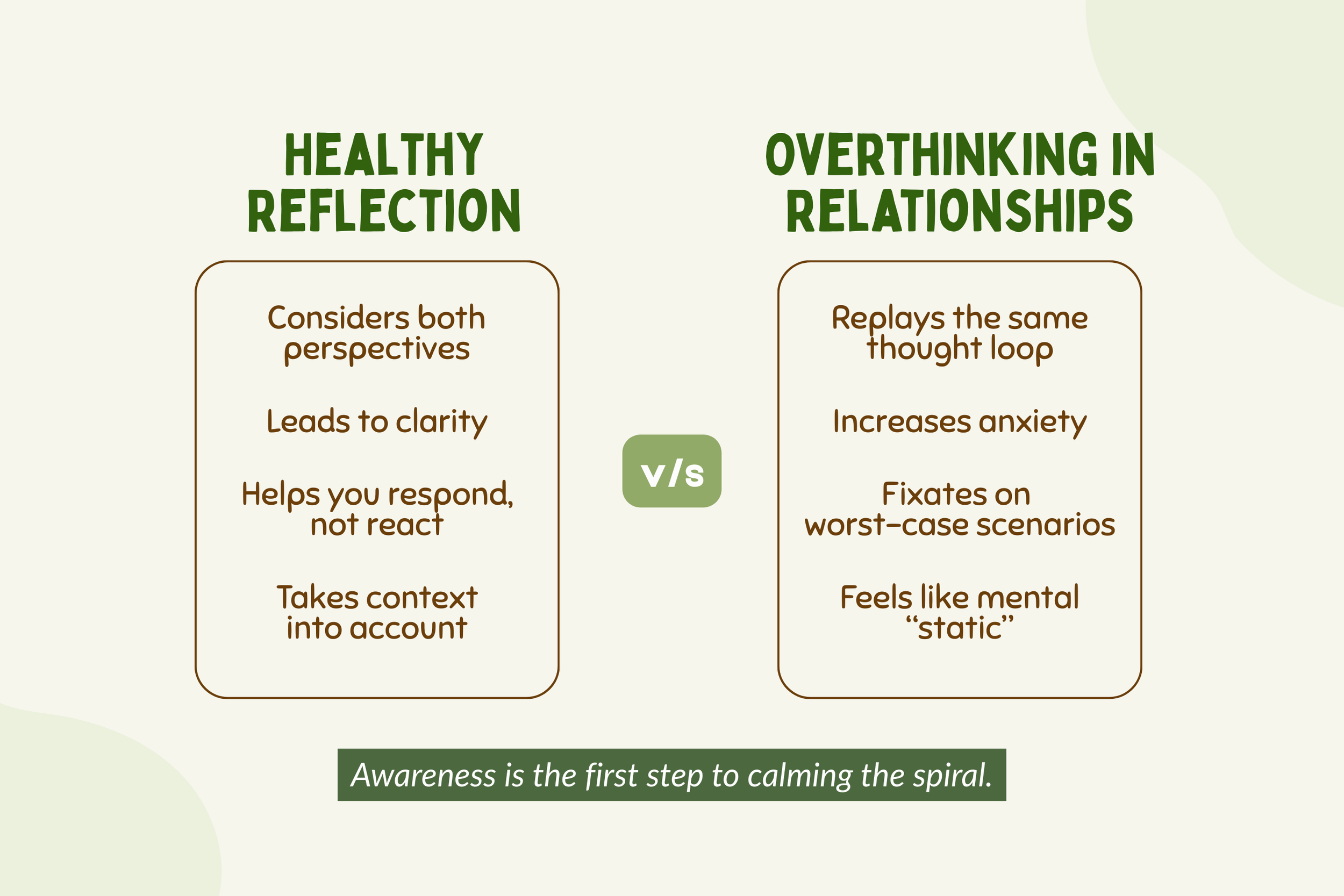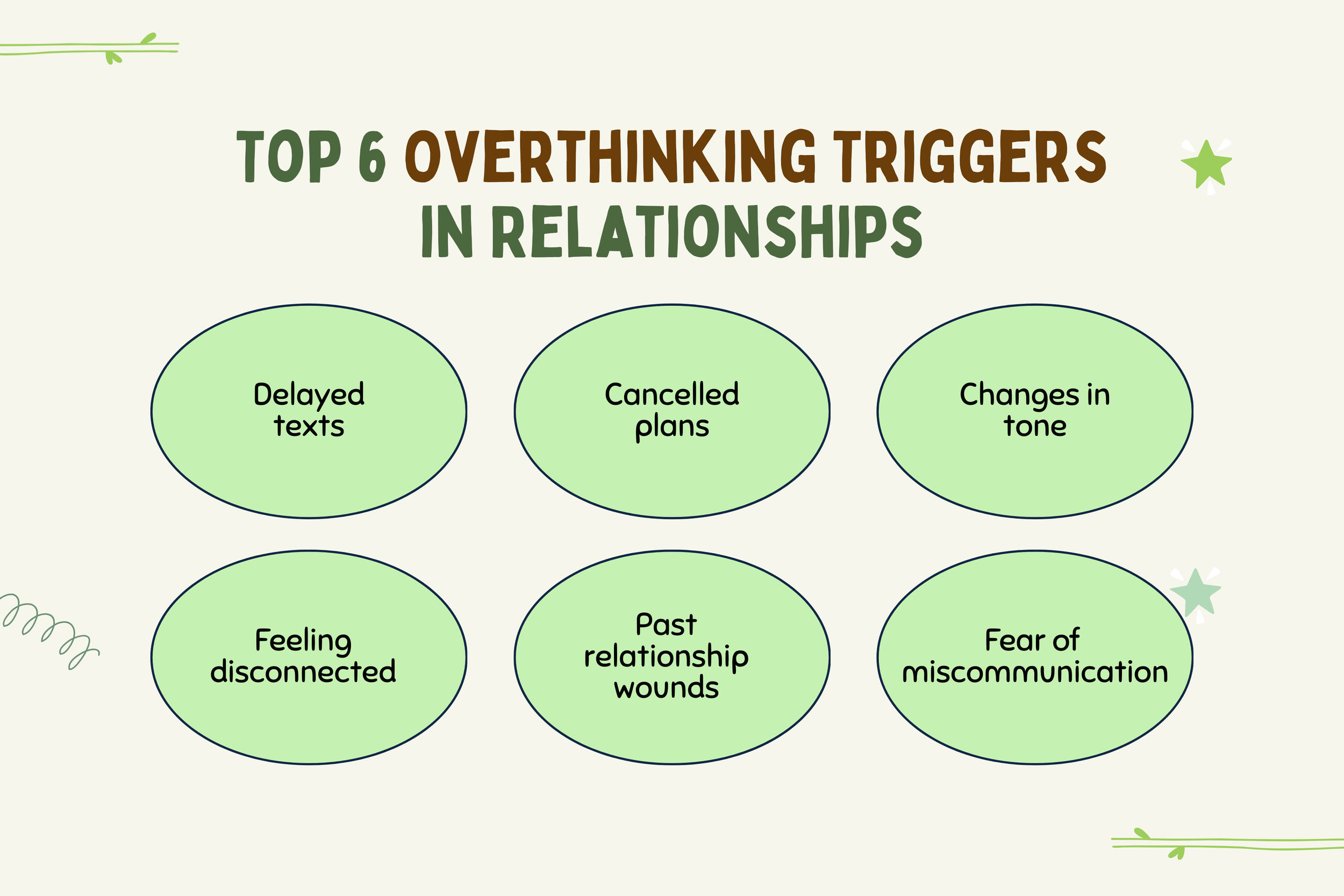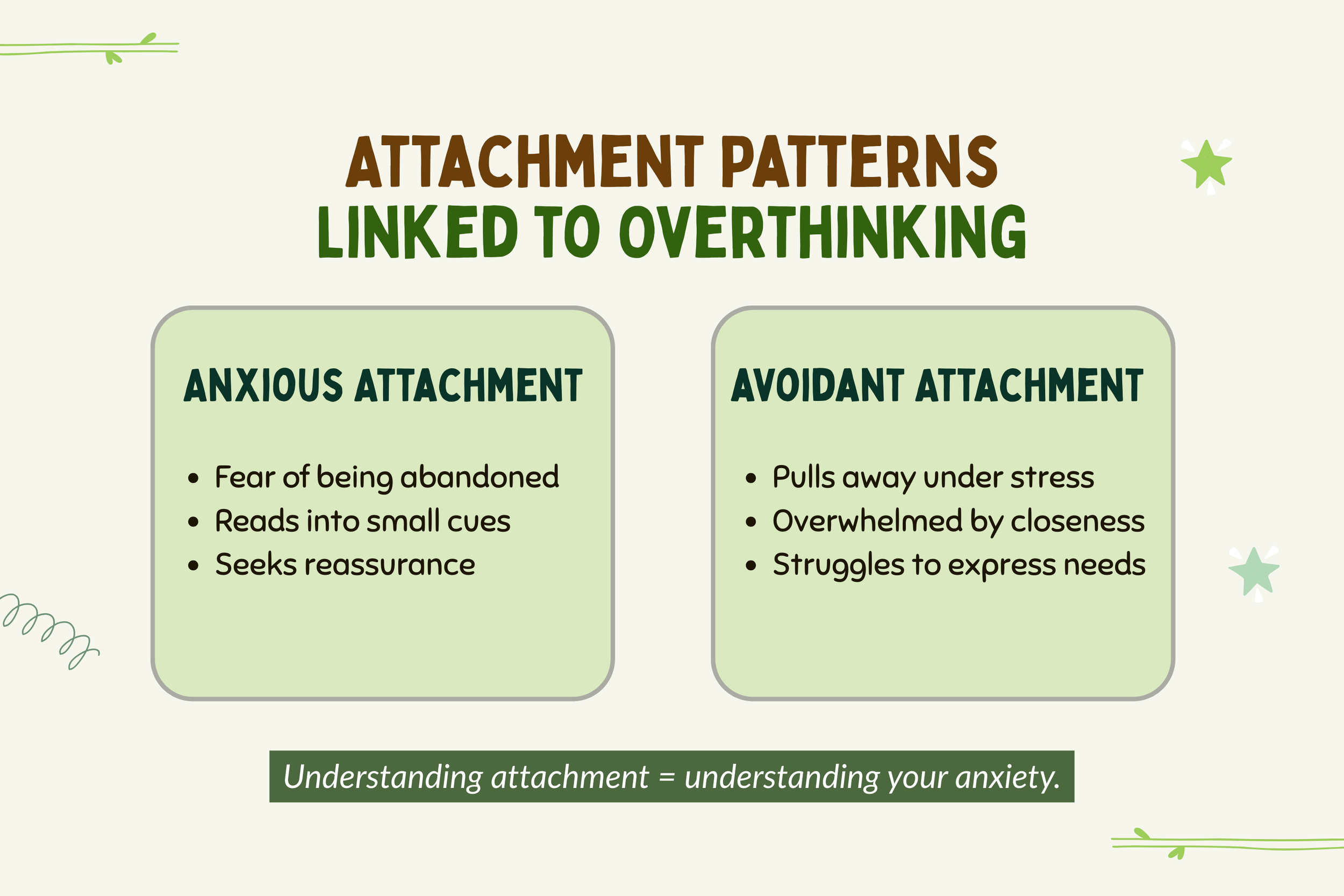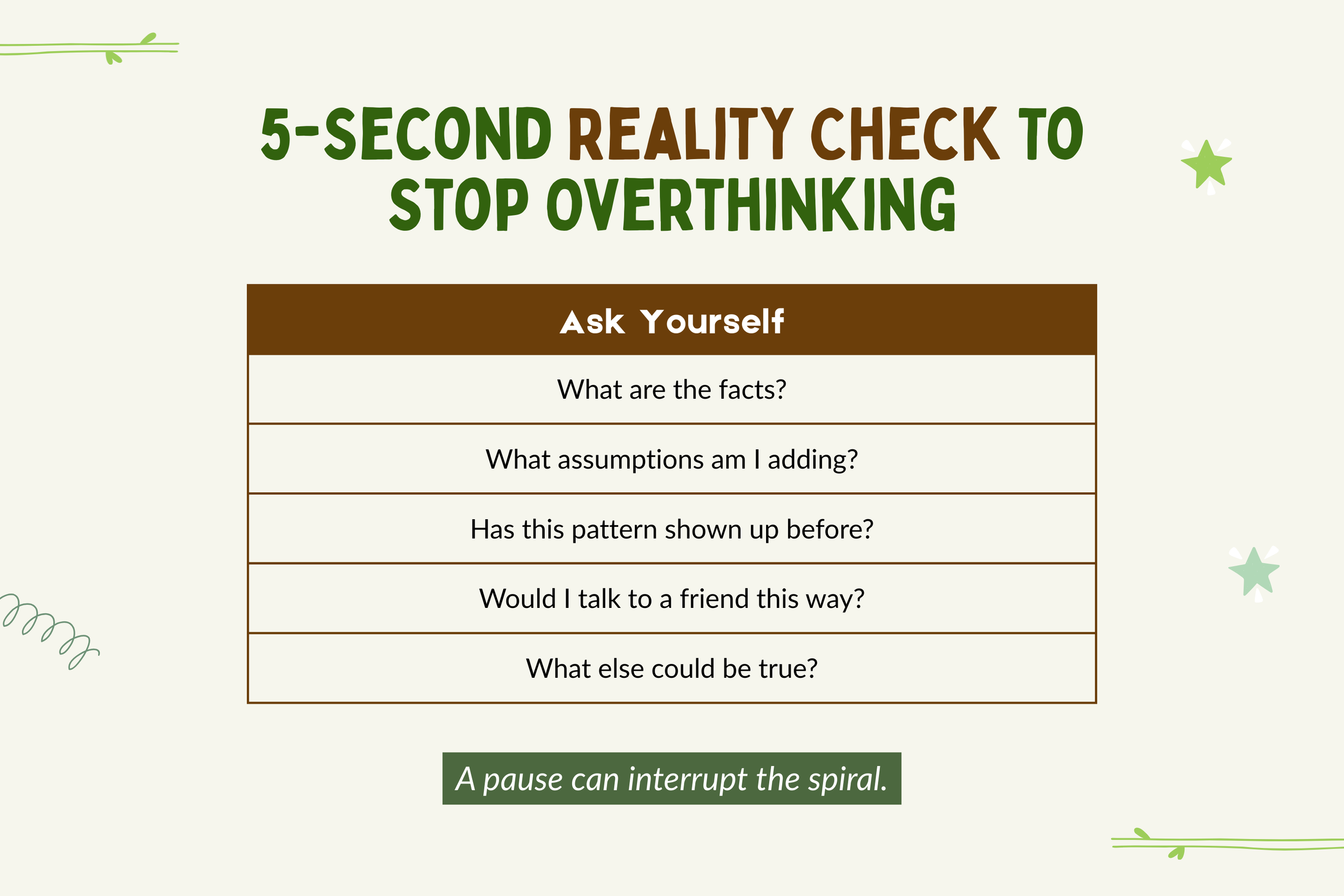Overthinking in relationships and differentiating normal rumination from relationship anxiety
Ivy Griffin
We’ve all been there. Whether you’re in a brand new relationship or you’ve been together for years, sometimes our thoughts spiral into anxiety and get the best of us.
And, if you’re a highly sensitive person (HSP), this is even more common because there’s a fine line between your tendency to think deeply and to get stuck in rumination.
Does this sound familiar
Something happens - your partner cancels plans, takes hours and hours to respond to a text, or is more distant - and your thoughts are off to the races.
○ Are they mad?
○ What if they’re avoiding me?
○ Are they upset that I forgot to unload the dishwasher?
○ Ugh, I bet we’re gonna have a fight later.
○ Do they not want to be with me anymore??
Our brains can quickly leap into catastrophizing by thinking about the worst possible outcome. The idea of that outcome is so upsetting that your thoughts ruminate on it, much like continuing to touch a bruise to see if it still hurts. Unsurprisingly, you hurt more and more each time you poke at the thought.
When anxiety and overthinking take over, you continue to ruminate. You overanalyze every little thing or you future-trip, and your thoughts get stuck on repeat, which can make it really hard to be present, focused, or feel connected with your person.
While it’s a very human experience for your thoughts to sometimes spiral, when you’re in a healthy, grounded place, you can usually notice the overthinking and reel it in fairly quickly.
They had that migraine yesterday, and I know how long it takes a while for their migraines to pass. I bet they need to stay home and take it easy so they can feel better.
Ok, I’m panicking, but it makes sense that they haven’t responded today because I know they have that big deadline at work. I bet they’re really busy.
They seemed off yesterday, but I have off days too. And, everything was really good this weekend. I can see if it continues, and if it does, check in with them.
Healthy reflection allows us to notice what is happening in our relationship, have our feelings about it, gather our thoughts, and come to a balanced perspective that takes both our and our partner’s point of view into consideration.
This kind of reflection reminds us that we have different experiences and perspectives from our partner, and that both are valid. We remember that just because we have a thought or a feeling doesn’t make it true, and we can slow down and reality check ourselves. We can also lean on our own self-understanding to recognize when we might be engaging in a familiar pattern that’s not very helpful and course correct.
What Is Overthinking in Relationships?
Overthinking is not a diagnosis, and you won’t find it mentioned in the Diagnostic and Statistical Manual of Mental Disorders (DSM). However, it is a very common human experience, especially when it comes to our relationships.
Overthinking happens when you find yourself thinking about a situation or issue over and over, and thinking about it more does not offer solutions or bring relief. Instead, the more you think, the more stuck and overwhelmed you feel. Your thoughts fixate on the same issue and play on repeat.
When you’re overthinking, it can feel like your thoughts are out of control and have taken on a life of their own. You may find yourself replaying past conversations or rehearsing what you’ll say in future conversations ad nauseam.
Your thoughts are like a dog with a bone, and they won’t let go of the issue you’re fixating on. Or, your thoughts might feel like a runaway train that’s about to careen off the tracks. It’s like your brain has its foot on the brake while simultaneously flooring the gas pedal - you’re revving internally, but you’re not going anywhere.
Overthinking uses up a lot of emotional and mental energy, and it doesn’t even help you get what you need!
Common Signs of Relationship Overthinking
○ Constantly analyzing every text
○ Comparison & self-doubt
○ Replaying conversations over and over
○ Creating stories in your head
○ Pursuer/distancer tug of war
○ Difficulty being present
○ Feeling more anxious than connected
While I often see clients struggling with all of these signs, overanalyzing texts, creating stories in their heads, and the pursuer/distancer tug of war are especially common issues that we talk about in therapy.
Nearly every day, a client will pull out their phone during a session to share a text exchange they had with a loved one. Usually, they’re trying to make sense of what the other person said or figure out how they want to respond.
Texting can be so tricky because of all the nonverbal communication, like body language and facial expressions, that are missing. Emojis help a little, but those can be interpreted differently, too!
It’s tough to accurately understand someone else’s meaning with so little info, especially if you’re feeling triggered by what your partner said.
Talking through a long or emotionally-laden text exchange in session can help you see the interaction from the perspective of a non-biased 3rd party, instead of getting lost in the trigger.
As humans, we create stories all the time. We tend to have pretty active imaginations, especially HSPs. When the stories we create are focused on an interaction with our romantic partner, and there’s a lot of missing information, I start to hear alarm bells.
In therapy, we’re able to explore those stories, look at each theme and where it might have originated, slow down any assumptions, and figure out how to reality check with your partner so that old patterns don’t get subconsciously repeated.
The pursuer/distancer tug of war is a frequent theme in therapy sessions. It’s based on attachment styles, and it’s a really common dynamic that plays out between one partner who is more anxiously attached and one partner who is more avoidantly attached. These attachment patterns usually stem from the partner’s early experiences in childhood but continue to show up in adult relationships.
Through therapy, we can explore the origins of these attachment styles and create more awareness about how the pattern is playing out currently, so that you can make more conscious choices about what to do differently and form healthier ways of attaching to others.
At Thrive Therapy & Counseling, we provide a safe, supportive space to help you work through your thoughts, ease your mind, and build healthier ways to navigate your relationship. Connect with us here.
Relationship Anxiety Symptoms vs Normal Worry
On any given day, we all feel a wide range of emotions, and studies have found that we may think more than 6,000 thoughts!
Because our thoughts and our feelings affect one another, we might jump from having a thought one moment about how cute our cat is and feeling a sense of love and affection to the next moment seeing a notification on our phone about an upsetting news article and feeling overcome with despair. This is normal.
So, you’ll have many different emotions as you go through your day, including anxiety. When we’re in a healthy psychological state, these feelings ebb and flow, usually in response to an event. We feel them - even when they’re uncomfortable, notice them, and move on or use our tools to cope with the emotions that are difficult. There’s a fluidity to our feelings.
However, sometimes an emotional state like anxiety becomes increasingly prevalent and dominates more of our experience. Then, we don’t feel our emotions as broadly, and more of our internal world becomes focused on the anxiety.
These anxiety symptoms include physical sensations such as:
Being shaky or sweaty
Having a racing heartbeat or a sense of being “on edge”
Feeling worried (like being sick to your stomach or having a knot in your chest)
Trouble relaxing
And behavioral symptoms:
Frequent cognitive distortions (described here: https://thrivetherapyandcounseling.com/overthinking/journaling-for-anxiety-mental-health-benefits )
Overthinking
Ruminating
Difficulty concentrating
When anxiety symptoms abound, you find yourself spending large amounts of time feeling anxious, and all that anxiety negatively affects your life. Your relationships may be impacted, you struggle to be productive, and it’s hard to enjoy things because the anxiety is so prominent.
Causes of Overthinking and Relationship Anxiety
Nature
I often see that overthinking and relationship anxiety stem from a mix of nature and nurture, i.e., your biology combined with your life experiences. You may have been born with certain traits that have a higher tendency to overthink, such as being a highly sensitive person (HSP) or an introvert.
Hsps have an innate temperament with a rich inner life and a tendency to think deeply before taking action or making a decision. Such careful analysis can be very helpful and effective, but it can easily cross the line into overthinking and anxiety.
Likewise, introverts naturally tend to reflect and ruminate internally (because they feel more rejuvenated by alone time than by time with others), which can lend itself to overthinking.
Nurture
Combine these traits with certain life experiences, like growing up in a family that was not responsive enough to your needs to help you develop secure attachment, and it can easily trigger overthinking. Having a history of insecure attachment makes you feel more anxious and uncertain about your relationships and your place in the world, so any perceived threat to a relationship can send your brain into panic mode as it overthinks, trying desperately to come up with a solution.
Other life experiences, like growing up in a family that placed high importance on success or academic achievement, may have taught you that you need to be damn close to perfect to be loved or valued. Perfectionism lends itself to overthinking as you try to come up with the exact right answer to respond to every situation because you feel like you have to get it “just right” or else…
Because we’re such social creatures as humans, our brains interpret feelings of abandonment or being unloved or unvalued as a threat to our very survival, which can trigger painful reactions like overthinking.
Trauma
In addition to the above experiences being a type of trauma, you might have experienced additional major or minor traumas in your life that prime you for overthinking. Feeling on edge and alert is a normal reaction to trauma, and hypervigilance, anxiety, and overthinking go hand-in-hand. Your overactive brain may just be trying to protect you as it overthinks about problems that don’t even exist yet.
Overthinking Relationship Anxiety vs Not in Love
When you’re all caught up in anxiety about your relationship, it can be really tough to sort out whether you actually don’t love your partner anymore or whether it’s anxiety running the show.
If you are struggling and are unsure, I recommend you ask yourself these questions:
Am I prone to anxiety in other areas of life?
How have my identity and self-image changed since initiating this relationship?
What exactly are the problems or doubts in my relationship, and what is their relationship to my values? (from Blog 5 - Link to it)
Then, spend significant time thinking about your answers, which could include journaling or talking this out with someone you trust who knows you well. I always recommend that you take your time when making a big life decision and don’t decide anything when you’re caught up in overthinking and anxiety. You need time to be mindful, self-soothe, and see if the feelings and doubts stay the same or if they fluctuate over time.
Therapy can be a safe and supportive space to explore and process your experiences to help you connect with what’s most important to you as you make a major decision about your relationship.
How to Stop Overthinking in a Relationship
Therapy as the foundation
Because the pattern of overthinking in a relationship is often ingrained from childhood, it works best when you combine a few different approaches to address the root cause. Working with a trained therapist or counselor can provide a safe, supportive landing spot from which you can understand your past and how it affects you today while building new skills to help you regulate your emotions and improve your communication with your partner.
Mindfulness
Mindfulness is key to helping you become more present-focused (because anxiety is often fixated on the future) and to have more body awareness, which then helps you identify and regulate your emotions and thoughts.
Journaling
Journaling can be such an important tool to increase your self-awareness of your thoughts and feelings and how they impact you, while also giving you space to process your experience and ground yourself before deciding what you want to do next.
Communication skills
Building or improving your communication skills is especially helpful for dealing with relationship anxiety. You want to be able to use clear, open communication skills to express your feelings, explain why, and ask for what you need while using your emotional awareness and mindfulness to recognize when to bring up your concerns vs. when to focus on self-soothing.
At Thrive Therapy & Counseling, we provide a safe, supportive space to help you work through your thoughts, ease your mind, and build healthier ways to navigate your relationship. Connect with us here.
When to Seek Professional Help for Relationship Anxiety
There are 3 red flags I look out for that signal a person with relationship anxiety would benefit from professional help:
You’re feeling anxious often, and it’s affecting your daily life, including how you interact with your partner.
You’re spending way too much time overthinking your relationship.
You feel overwhelmed, stuck, and unable to stop.
If you’re struggling with anxiety about your relationship, please know that addressing it proactively can be even more helpful than responding reactively. This means that it’s usually easier to work through the anxiety before it is so ingrained as to hit these red flags, so don’t hesitate to reach out for support before it’s having this big of an impact on you.
That said, please don’t fear if you identify with these warning signs. It’s never too late to seek help. Our brains are malleable and can change throughout our lives.
Our team of therapists at Thrive Therapy & Counseling would love to support you in navigating relationship anxiety and building new patterns to create the relationships you want and deserve. Just reach out.




